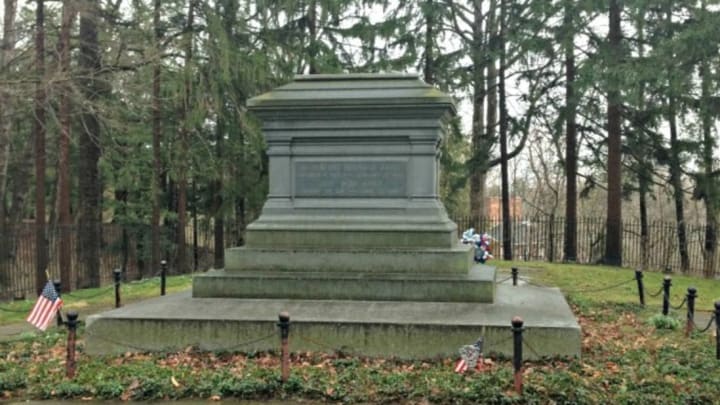Every time we so much as touch a toe out of state, I’ve put cemeteries on our travel itinerary. From garden-like expanses to overgrown boot hills, whether they’re the final resting places of the well-known but not that important or the important but not that well-known, I love them all. After realizing that there are a lot of taphophiles out there, I’m finally putting my archive of interesting tombstones to good use.
Former President Rutherford B. Hayes was dubbed one of the most forgettable POTUSes in history by Time—and they’re not wrong. Most people would probably be hard-pressed to tell you anything about the 19th U.S. president or his single term in office. And during his reign, many thought he shouldn’t have been president at all—the 1876 election was tainted by accusations of voter fraud and intimidation. It was one of those strange years where one candidate, Hayes, won the electoral vote and the other candidate, Samuel Tilden, won the popular vote. You may recall the same thing happening in 2000 with George W. Bush and Al Gore. After Hayes was determined the winner, he was dubbed “His Fraudulency” and “His Accidency” by Tilden supporters.

Library of Congress via Wikimedia Commons // Public Domain
Hayes did several notable things—good and bad—during his single term, including sending federal troops to deal with the Great Railroad Strike of 1877, settling a territorial dispute between Paraguay and Argentina, and developing policies on the treatment of Native Americans. Still, the presidential policy Hayes is best remembered for has nothing to do with government or law-making—it was his preference for a dry White House. His ban on wine and liquor didn’t extend just to the Hayeses’ own personal meals, but also to any dinners or banquets his administration hosted. Though many have blamed the ban on his wife, giving her the nickname "Lemonade Lucy," other accounts say that not serving alcohol was just as important to Rutherford.

Stacy Conradt
The Hayeses’ second son, Webb, was a Medal of Honor recipient and lobbied hard to found the Rutherford B. Hayes Presidential Center, the first presidential library.After a controversial election and term, Hayes decided not to seek reelection. He died of a heart attack 12 years after leaving the White House and was initially buried at Oakwood Cemetery in Fremont, Ohio. In 1915, both he and Lucy were transferred to the grounds of their home in Fremont, Spiegel Grove, the same place where he once conducted his “front porch campaign” for the presidency. Webb is also buried at Spiegel Grove

Stacy Conradt
Peruse all the entries in our Grave Sightings series here.
